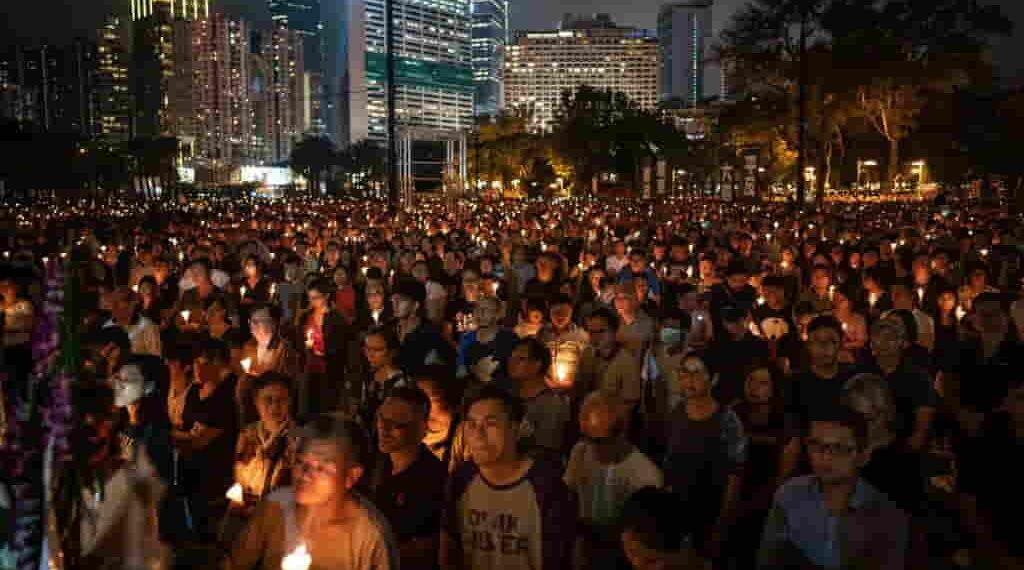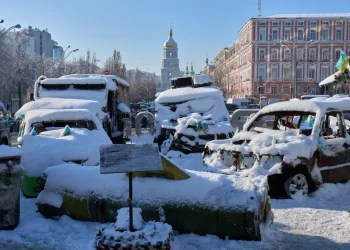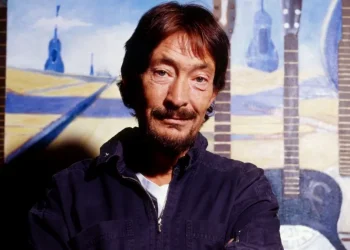Hong Kong’s Defiant Memory: A Decade of Protest Silenced
Kenneth’s memories flooded back as he walked through Victoria Park in Hong Kong, a place once at the heart of the city’s resistance to China.
As a child, he would buy calligraphy posters from pro-democracy politicians at the annual Lunar New Year fair. In his teenage years, he joined protest marches that started in the park before winding through the city. At just 12, he attended the massive vigils in the park for the Tiananmen Square massacre, a sensitive topic in mainland China but openly commemorated in Hong Kong.
Now, those vigils are gone, the fair’s political stalls have disappeared, and protests have been silenced. Pro-democracy activists have been jailed, and Kenneth feels the political spirit of Hong Kong, once so vibrant, is slowly being erased.
“People continue their lives, but you can feel the change, bit by bit,” said Kenneth, who preferred not to reveal his real name. “Our city’s character is disappearing.”
On the surface, Hong Kong seems unchanged: packed trams still rumble through the streets, and the neon-lit skyline remains as chaotic as ever. But if you look closer, the transformation becomes apparent—from skyscrapers that now glow with patriotic slogans celebrating China to the increasing presence of Mandarin alongside the city’s native Cantonese.
While it’s unclear how many of Hong Kong’s seven million residents support Beijing’s tightening grip, the city has witnessed mass protests since 2014, with hundreds of thousands joining the pro-democracy movement. Though not everyone supported the movement, it’s clear that Beijing’s response has crushed it.
As the decade of turmoil draws to a close, hopes for a freer Hong Kong have faded. Under the sweeping national security law (NSL), hundreds have been jailed, and many activists have fled abroad, fearing arrest. Others, like Kenneth, have stayed but live in the shadows.

But even as the city changes, memories of a freer Hong Kong endure. It is a place that many refuse to forget, standing defiant against Beijing’s attempts to rewrite its identity.
When Hong Kong was handed back to China in 1997, it was promised a high degree of autonomy, including rights like free speech and the rule of law, for 50 years. But over time, as Beijing’s influence grew, so did the unease among pro-democracy groups.
The pro-democracy movement gained momentum in September 2014 when tens of thousands of people staged sit-ins to demand fully democratic elections. This movement, known as Occupy Central, brought young activists like Joshua Wong and Benny Tai to prominence and set the stage for even more intense protests in 2019. These protests, sparked by a proposed extradition law, grew into a broader fight for democracy, becoming the most serious challenge to Beijing’s authority in Hong Kong.
Chan Kin-man, co-founder of Occupy Central, recalls that Benny Tai was key to the movement’s success. “Without Benny, there would have been no Occupy Central,” Chan said. Tai was a bold scholar who pushed for change, and it was people like him who shaped history.
After serving 11 months in prison for his role in Occupy Central, Chan moved to Taiwan in 2021. Tai, meanwhile, remains in Hong Kong, sentenced to a decade in prison for subversion.
Earlier this month, more than 40 pro-democracy activists, including Joshua Wong, were sentenced. Wong, as he left court, shouted, “I love Hong Kong.” The trials have been subdued, in stark contrast to the fiery protests that preceded them. Demonstrators have been silenced, with any signs of dissent quickly suppressed.
Beijing defends these measures, claiming they are necessary for stability, while critics accuse China of breaking the promises made in 1997, weakening Hong Kong’s courts, and stifling the city’s pro-democracy movement.
Chan, watching from afar, expresses deep sorrow at Hong Kong’s current state. He believes the possibility for change has vanished. “Hong Kong is no different from any other Chinese city now,” he said.
Still, he presses on with efforts to preserve Hong Kong’s democratic spirit, writing a book about Occupy Central, organizing conferences, and giving lectures on democracy and politics. These actions keep him connected to his homeland, despite the distance.
Kenneth, meanwhile, continues to live in Hong Kong, even as friends leave the city in large numbers. He finds comfort in staying, despite the drastic changes. “Hong Kong is still here. Its people are still here,” he insists, though he acknowledges that speaking out has become increasingly dangerous.
Today, activists are cautious—petitions and small-scale activism are the new norms. Public rallies, marches, and protests are off-limits, as many fear arrest. A recent wave of arrests over t-shirts, social media posts, and books reflects the harsh reality of Hong Kong’s current state.
Kenneth finds himself going out less, unwilling to remember a time when protest was possible. Yet, as he walks through Victoria Park and past government buildings, memories resurface—like the day he was tear-gassed for the first time during the 2014 protests, or the clashes at Hong Kong Polytechnic University during the 2019 protests.

The university, like much of Hong Kong, has erased traces of its rebellious past. But Kenneth, ever defiant, believes some memories will survive. “Forgetting the past is a form of betrayal,” he says.
Thousands of miles away, in the UK, Kasumi Law recalls what she misses most about Hong Kong. “I never knew how much I loved the sea until I left,” she reflects, sitting in a café in Watford, England. The shiny waters of Hong Kong, framed by towering buildings, now feel distant, as does the city she once knew.
Kasumi and her family moved to the UK after growing discomfort with Beijing’s increasing control. The 2014 Occupy Central protests began just after her daughter was born, and over the years, Beijing’s crackdown intensified. By 2019, with the arrival of a new visa scheme for Hongkongers, Kasumi and her husband decided to leave for the sake of their daughter’s future.
Though life in the UK has brought new opportunities, Kasumi struggles with homesickness. She often records her feelings in video diaries, which have resonated with other Hongkongers, though some criticize her decision to emigrate.
When she returned to Hong Kong last year, she saw how much had changed. Her mother looked older, beloved shops had closed, and the city now felt alien, with Mandarin replacing Cantonese as the dominant language.
“Looking at the sea felt familiar, but the people around me felt strange,” she says, teary-eyed. Kasumi now fears what might happen if she returns. The new security laws have made her wary of speaking out, and she wonders whether she would even recognize the Hong Kong she once called home.
But she hasn’t abandoned her roots. Kasumi and her husband speak Cantonese to their daughter, sharing their culture and heritage even from abroad. Their daughter, though too young to understand the significance of the 2014 and 2019 protests, already responds defiantly when others call her Chinese.
“I’m not Chinese. I’m a Hongkonger,” she tells them proudly.
Even in exile, Kasumi is determined to preserve the spirit of Hong Kong in her daughter—one protest at a time.
This article was rewritten by JournosNews.com based on verified reporting from trusted sources. The content has been independently reviewed, fact-checked, and edited for accuracy, neutrality, tone, and global readability in accordance with Google News and AdSense standards.
All opinions, quotes, or statements from contributors, experts, or sourced organizations do not necessarily reflect the views of JournosNews.com. JournosNews.com maintains full editorial independence from any external funders, sponsors, or organizations.
Stay informed with JournosNews.com — your trusted source for verified global reporting and in-depth analysis. Follow us on Google News, BlueSky, and X for real-time updates.













